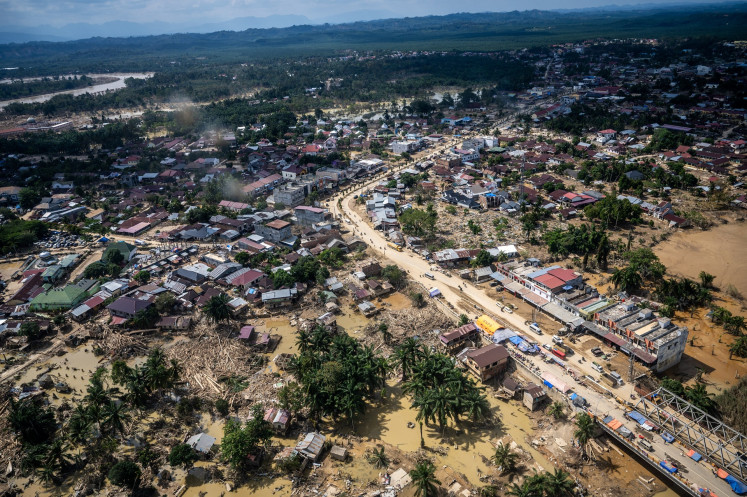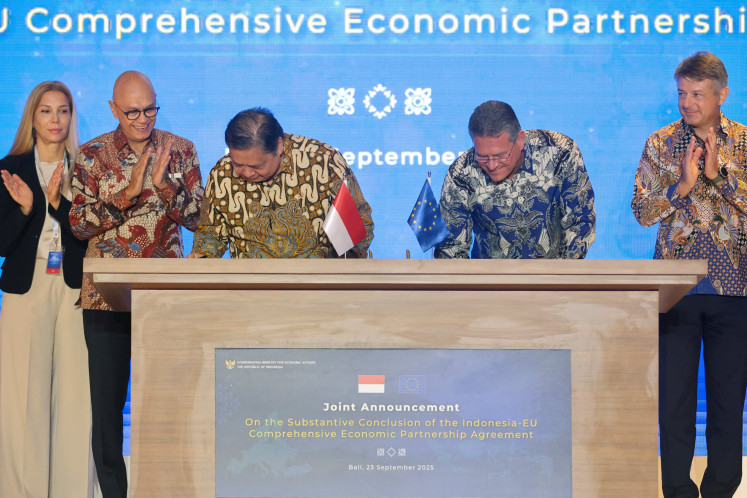Popular Reads
Top Results
Can't find what you're looking for?
View all search resultsPopular Reads
Top Results
Can't find what you're looking for?
View all search resultsEditorial: Shameful days
It was no exaggeration that many Indonesians this past week felt ashamed of their country
Change text size
Gift Premium Articles
to Anyone
I
t was no exaggeration that many Indonesians this past week felt ashamed of their country. Once proud of declarations hailing the nation for its moderate Muslim majority and pluralistic ethos, the public was jolted by reports of a series of attacks on religious minorities.
The disgust was not so much for the attacks, although the violence in and of itself was despicable. What shocked people was the brutality of the assaults and the government’s aloof response to previous calls to protect minority religious rights and communities.
Did the nation need to see so much death and destruction before authorities took action and realized that their proclamations of interracial harmony were nothing more than empty rhetoric?
“Barbaric” and “sadistic” were the two words most commonly used to describe the onslaught on Feb. 6 that took the lives of three Ahmadis in Umbulan village, Banten.
It was not the first public incidence of prejudice and assault. Just look at the forced expulsion of hundreds of Ahmadis from Lombok Island in 2001, 2002 and 2006 which lead to the death of one in 2001.
The root causes of violence may also lie beyond theological differences. Resentment of the Ahmadis appears to be fueled by allegations of their exclusivity.
Regardless, prejudice and violence directed at minority faiths is not limited to any one group.
Just two days after the attack in Banten, mobs destroyed three churches in Temanggung, Central Java. Violence erupted following a hearing in the blasphemy trial of Antonius Richmond Bawengan.
The aggression was reportedly sparked after the mob was dissatisfied with prosecutors’ demand that Antonius be sentenced to five years’ imprisonment for alleged blasphemy against Islam via books and articles in October.
These violent acts not only tarnished Indonesia’s reputation as a peaceful pluralistic nation but sullied the start of a conference which should have celebrated the country’s diversity.
A meeting of the World Interfaith Harmony Week which began in Indonesia on Feb. 6, the day of the Ahmadi massacre, highlighted the fragility of interfaith harmony and reminded everyone of the gap between pronounced declarations and the practical realities at hand.
Roundly criticized for the government’s failure, President Susilo Bambang Yudhoyono responded to the attack that authorities should “seek legal ways, if necessary, to disband” groups or organizations that acted violently.
In a speech at the commemoration of the 2011 National Press Day in Kupang, East Nusa Tenggara, on Wednesday, Yudhoyono said, “We will not tolerate hate-speech or calls on certain communities to commit violence, including murder”.
He stopped short of naming any groups, though many believed he was referring to the Islam Defenders Front (FPI), a local hard-line group known for its violent raids on nightclubs and animosity toward anything blaspheming Islam.
The response from his ministers was more vague. Home Minister Gamawan Fauzi said there were no mass organizations that have disturbed public order that need to be disbanded. He added that an organization could be disbanded if they were thought to have disturbed public order or received foreign aid that induced them to provoke unrest.
Amid the gloom, the economic front brought more encouraging messages.
Indonesia’s gross domestic growth (GDP) in 2010 was considered encouraging as it indicated a rise in private consumption and investments.
New investment contributed 32.2 percent to the country’s economy, mainly due to improved macroeconomic conditions in nearly every Southeast Asian economy. Indonesia pocketed an upgrade from major ratings agency Moody’s Investors Service last month to one notch below investment grade.
According to the Central Statistics Agency (BPS), investment contribution grew from 31.1 percent in 2009 and 27.7 percent in 2008.
The economy expanded 6.9 percent during the October-December period, which some economists considered “quite surprising”, not only because it exceeded the 5.8 percent growth in the previous quarter, but also surpassed analysts’ expectations.
The Indonesian economy grew 6.1 percent in 2010 — higher than the government’s initial 5.8 percent target in the 2010 state budget. The latest economic figures showed that Indonesia has an economy that topped Rp 6,422.9 trillion and had a population of 237.6 million at the end of 2010. The country’s per capita GDP also rose to Rp 27 million versus Rp 23.9 million in 2009.
All nine sectors in the nation’s GDP basket gained, led by the transportation and communication sectors with combined 13.5 percent growth. The agricultural sector recorded the least growth at just 2.9 percent.
Meanwhile, Garuda Indonesia’s initial public offering (IPO) got off to a less-than-impressive start. Shares in the flag carrier were not fully purchased by investors, with 47 percent of the rights issue bought by underwriters, according to data from the Indonesia Stock Exchange (IDX).
According to the IDX, 3.01 billion shares (47 percent) of the 6.33 billion initially offered were bought by underwriters, while the remaining 3.32 billion were absorbed by investors.
Underwriters for the IPO were comprised of Mandiri Sekuritas, Danareksa Sekuritas and Bahana Securities, while the international sales agents included UBS AG and Citigroup Inc. The underwriters spent Rp 1.41 trillion to purchase unsold shares, in reference to the IPO price of Rp 750 a share while Garuda secured Rp 3.3 trillion (US$350 million) in the initial offering.
— Meidyatama Suryodiningrat









